- Home
- C. G. Cooper
The Patriot Protocol
The Patriot Protocol Read online
“The Patriot Protocol”
Book 1 of The Patriot Protocol Series
Copyright © 2016 C. G. Cooper. All Rights Reserved
Author: C. G. Cooper
Editors: Andrea Kerr & Cheryl Hopton
Get a FREE copy of any C. G. Cooper novel just for subscribing at
>> http://CG-Cooper.com <<<br />
This is a work of fiction. Characters, names, locations and events are all products of the author’s imagination. Any similarities to actual events or real persons are completely coincidental.
Any unauthorized reproduction of this work is strictly prohibited.
Warning: This story is intended for mature audiences and contains profanity and violence.
Dedications
To my loyal group of Novels Live warriors, thanks for your undying enthusiasm.
To our amazing troops serving all over the world, thank you for your bravery and service.
And to the United States Marine Corps: Thank you for standing on that wall.
Semper Fidelis
TABLE OF CONTENTS
Definition of Protocol
Prologue
Chapter 1
Chapter 2
Chapter 3
Chapter 4
Chapter 5
Chapter 6
Chapter 7
Chapter 8
Chapter 9
Chapter 10
Chapter 11
Chapter 12
Chapter 13
Chapter 14
Chapter 15
Chapter 16
Chapter 17
Chapter 18
Chapter 19
Chapter 20
Chapter 21
Chapter 22
Chapter 23
Chapter 24
Chapter 25
Chapter 26
Chapter 27
Chapter 28
Chapter 29
Chapter 30
Chapter 31
Chapter 32
Chapter 33
Chapter 34
Chapter 35
Chapter 36
Epilogue
protocol
- a system of rules that explains the correct conduct and procedures to be followed in formal situations
- a plan for a scientific experiment or for medical treatment
- a document that describes the details of a treaty or formal agreement between countries
Prologue
I shot the first one in the face. It hadn’t been my intention; it wasn’t how I’d been trained. Center mass - always aim for center mass. It gives you the greatest chance of hitting your target, the head being the smaller target.
So, when the first bullet exploded from the back of the intruder’s head, I adjusted my aim and shot him twice in the chest. I probably didn’t need to, but it was habit.
The dead man’s accomplice raised his rifle to shoot. He had arms the size of tree trunks and a barrel-shaped belly. I felt the bullet whiz by my head. It was so close, like a bumblebee doing a flyby.
My first shot didn’t miss, but neither did my second. He took the rounds in the chest with wide eyes. I could almost hear him thinking, “How could I get shot?”
Really? How could he think that? He came into my house, where I try to keep my wife and three kids safe, and he has the balls to think, no assume, that he would not get shot? I shot him again, the old anger palpable now. It tasted like iron nails in my mouth, the reasonable me gone for the briefest moment.
I watched the second intruder squirm for a few seconds, my pistol always aimed at him in case he could be stupid or strong enough to threaten my loved ones again. Finally, he ceased all movement.
One. Two. Three. Four. Five. I counted deliberately, another old habit.
My breathing slowed, the adrenaline sap leaving me drained a couple of levels.
That’s when I remembered that my two oldest children were behind me. It had been my daughter’s scream that brought me running, and now when I turned to face my kids, she stared at me with blank eyes. I wanted to run to her and hold her beautiful face against my chest. My sweet child, the innocent one who took offense at even the most childish slight, was clearly in shock. Most days she had the maturity of a nineteen-year-old, but right now she looked like a fragile little nine-year-old girl. She was in shock, but I knew she would deal with it in her own way. Both children had just witnessed a new reality, much worse than anything they had seen before.
Then there was my son, all boy at almost seven years of age. He clung to his sister, not out of necessity, but because he sensed she needed the physical contact. He stared at me with a mixture of awe and trepidation, like he wanted to ask me what I was thinking or how I was feeling. He was always asking that sort of thing. Funny, really. I call him my little professor.
Now they came to me, tentatively at first, then they ran into my open arms. My daughter wouldn’t let go of my neck, while my son stroked my back, as if I required comforting.
I smiled, despite the dead duo mere feet from us. We were safe, for the moment, and I inhaled the innocence of my children. It was similar to when I’d marveled at their tiny toes and fingers when they were born. How I wished I could go back to that time, that world. In those days, safety was a given. Nights weren’t spent with a gun at my side, listening to the light snores of the children sleeping a few feet away.
But those days were gone, swept away by the violence that now threatened to envelop us again. I kissed my children on their heads, lightly, as if they might break. I would do anything to keep them alive for another day.
Chapter 1
The Tennessee Zone
Year 2057
I pushed past the barricaded front door and took in a deep breath. The morning chill tickled my nose and sent shivers up my back. While I relished the fresh crisp air, the rest of my body was tense, my senses reaching out to the trees encircling our small grove. It had been our haven, a place where the children could play in relative safety. However, Jane or I always sat on the rickety old porch with a long rifle and shotgun, protecting our children.
The kids knew not to go far. Well, all except for little Charlie. He had a gift for sniffing out trouble, and at a bubbling two and a half years of age, he had more than enough energy to keep us on our toes.
But on this morning he was curled up in Jane’s lap. Sybil, our oldest, and Andrew, our second oldest, kept vigil with their mother. We’d waited for dawn together, like we always did. It was hard teaching your kids that the pre-dawn hours were the most perilous, that stretch of time when silent enemies converged. In the old days, kids slept from dusk until dawn. Not now. To me, it seemed they never had.
I took a step off the porch, the ground greeting me with a squish. The long days of rain had finally slacked off, and I was anxious to get on the move. Jane and I had talked about scoping out our territory. It had been the first attack in a while; we had many questions. We still didn’t know how the two men had found us, and I’d expected their comrades to run to their aid. But no one had come.
That didn’t mean they weren’t in the far tree line. I’d done my best to keep the underbrush at bay, but there were still plenty of places to hide. I imagined them watching me, just waiting for me to make a mistake.
As I stalked across my land, I saw no movement from any direction. There were no other sounds beyond the spongy squishes as I walked, the birds chirping and the rustling of leaves.
Then I saw footprints. They were headed to the tiny cabin we’d called home for the longest time, since it had all happened. I followed the trail back to where the prints originated, automatic rifle ready. I followed the two pairs of boot prints; those presumably from the dead men who were now stacked like firewood behind our cab
in.
I breathed a sigh of relief when I found their packs behind the tree nearest the hay field. Much like their shooting technique, their gear looked worn and unprofessional. The two packs held soiled sleeping sacks and clothes I was surprised I hadn’t smelled from our cabin. I searched through their belongings. I found a tin of food pills, some extra ammunition and three canteens. One canteen was half full of liquor, probably moonshine. I dumped the rotgut onto the ground and kept the canteen.
I’d come back for the things later, after a vigilant loop or two around my property.
By the time I saw the sun peeking out over the trees, I was certain that the two men had been alone. There was only one pair of tracks coming in, except for the familiar deer and coyote stamps.
As I returned to the cabin, I attempted to devise a game plan. The kids would need to know what we were doing, especially the older two. They were both at ages where every action was preceded by a question. Part of me loved that, despite the world we now inhabited. Despite the dangerous conditions, their hearts remained childlike – innocent and inquisitive. It wouldn’t always be that way, but I hoped to preserve that for as long as I could.
But with questions must come answers, and as I scraped the mud off my boots, I prepared myself for their inquisition.
“Where are we going, Dad?” Andrew asked. He didn’t say Daddy. When had that changed?
“I’m not sure yet, buddy, but we can’t stay here.”
“Because of the bad men?” Sybil asked.
I glanced at Jane who gave me a small smile. She was my rock, always there.
“Yes, honey, because of the bad men,” I said, stroking my daughter’s sun-streaked hair.
“Can we go to the city? Do you think we can go to the city?” Andrew asked, barely able to contain his exuberance. For Andrew and Charlie, the city held magical powers and treasures yet to be explored.
“Yeah. City, Daddy, city,” Charlie parroted.
I couldn’t help but laugh. “I don’t know yet, guys. We’ll have to wait and see.”
The kids took leaving much easier than I’d expected, more than likely due to Jane’s innate gift of making them think they were embarking on a new and exciting adventure. Instead of focusing on the drudgery of packing, they focused on the new chapter in their lives. No one complained as we finished packing our belongings, and even Charlie asked to carry something. I told him that Topper, his earless teddy bear, was his responsibility. He nodded like I’d just put him in charge of guarding the entire family.
It was Jane who took our departure the hardest. She’d worked hard to convert the one-bedroom cabin into our oasis. Miles from civilization, the little home had seen many happy times. I remembered, with a pang of regret, all the “firsts” that the cabin had seen. Here was where Charlie had taken his first steps, where Andrew had made forts and where Sybil loved to chase butterflies.
Jane and I exchanged a look, and then I grabbed her hand, fingers quickly entwined for mutual support.
“I love you,” I said.
“I love you too,” she replied, stroking a thumb over the back of my hand.
Our reminiscing was interrupted by Andrew declaring, “Come on guys; it’s time to go.”
“Yeah, time to go,” parroted Charlie.
With one last look back, we stepped off on our new adventure.
+++
It was always shocking to see civilization, or at least what it now looked like. As we sat on the small hillock overlooking what was once the thriving downtown community of Franklin, Tennessee, I remembered taking Jane to dinner at a place on the corner. It had been a pizzeria with every topping combination you could imagine. I still tasted the salty anchovies, and just the thought made my mouth water. Now, the building was gone, replaced by tarped shanties, under each of which a handful of families was probably living.
I never understood why so many of the survivors had decided to congregate. Jane said it was due to an inherent need for community. During tough times, people banded together looking for safety in numbers and comradeship. I’d asked her if she needed that, and she said that all she wanted was me and the kids. Even though I believed her, I thought I sensed a longing there, like she needed something more. That was Jane: she was the people person. I was content living miles away from society until supplies were low. Only then did I feel the need to come into town. But, with the kids getting older, maybe we all needed more comradery.
“I’ll be back in an hour,” I said.
Jane nodded, but Andrew said, “I want to go with you, Dad.”
“Sorry, Bud. This is a solo mission. Next time, okay?” He looked disappointed, but I knew he’d snatched the “next time” out of the air and stuffed it into his six-year-old brain. “I’ll see if I can find some candy.”
That made his eyes light up, and Charlie mouthed, “Candy!”
I put a finger to my lips and then kissed each one of them on the head. With one last kiss for Jane, I trudged off to stock up on our dwindling supplies and see what news I could find.
I wore my weapons openly. Like the Wild West I read about as a kid, it was best to be seen armed. No one thought twice about the open display of arms anymore, and it sure as hell kept you out of trouble that came hunting.
I passed the old grocery story that had been converted into living quarters. The smell of a bird cooking over an open fire wafted down from the second floor window, and the smoke reached lazy fingers into the boulevard. It didn’t smell as good as what Jane liked to cook, but it was still tempting my empty belly.
As I lazily walked down the street, wary eyes followed my every step, I noticed a crude poster secured to the brick wall. It was a recruitment poster, the first I’d seen in ages.
Want real food and a place to live out your days? Join the Tennessee Armed Forces. Visit us at the old Nashville Airport to apply. Families welcome.
I shook my head. No promise of food or safety could ever make me return to that. I’d lived it before The Collapse, and I had no inclination to see what military life had devolved to. Sometimes when I went hunting, I saw their personnel carriers driving along the remnants of the highways. There’d even been the occasional flyby from those dark batwing aircraft. That had been the extent of my involvement, an old curiosity.
My first stop was Pete’s place. In town, Pete was the closest person to what I could call a friend. He greeted me with a slow nod of his massive head. It appeared the wrinkles from his bald scalp threatened to cascade over his low-slung eyes. The personal energy cannon lazily resting in his lap warded off any errant thief.
“Ryker,” he said in the way of greeting.
“Hey, Pete.”
“What are you in the market for today?” He shifted in his seat, trying to see if I’d brought anything to barter.
“Food supplements, water tabs and a new blanket.”
“Moira!” he yelled, and a second later a shy face poked out from the shadows. The slight form of Pete’s daughter slinked out from the storeroom.
“Yes, Daddy?”
“Can you please get Mr. Ryker a box of food supps, a bag of water tabs and that blanket you just knitted?”
“Yes, Daddy.”
I’d never heard her say more than, “Yes, Daddy.”
The girl disappeared to the back, and Pete asked, “What do you have for me?”
“Ammo,” I said.
“Yours?”
I nodded. “Made it last week.”
“Caliber?”
“5.56 or .45.”
“I’ll take the .45. Too bad you can’t make extra charges for my baby here.” He patted the cannon lovingly.
I unslung my day pack and grabbed what I thought was a sufficient amount of ammunition for payment. The handful I laid on the table was quickly snatched up by Pete and examined like precious jewels. After he seemed satisfied, he said, “A couple more and we’re even.”
“Got any candy you can throw in?”
Pete let out a low whistle. “Bi
g spender today, aye, Ryker? Did someone forget to tell me it was Christmas?”
I was a notoriously cheap man when it came to extravagances. My kids and Jane had loosened the proverbial purse strings a bit, but I still clung to our hard-fought bartering system, whenever practical.
“What can I say, a good wife can teach an old dog new tricks.”
He laughed and yelled for his daughter to add candy to the order. The cost of adding candy was more than I usually paid for much more practical supplies, but the thought of the smiles on my kids’ faces pushed my normally frugal thoughts aside in an instant.
Once I’d packed my purchases in the day pack, I asked Pete, “Do you have any room at your house to spare, say for a couple nights?”
That made his hooded eyes widen.
“You in some kind of trouble?”
I debated whether to tell him about the night before. This was Pete after all. If there’d been a mayor in Franklin, he’d be it. I only knew him from my infrequent visits to town, but by every indication I knew he was a man to be trusted.
“We had a visit last night,” I said quietly. “I did what I had to do.”
“Is your family okay?”
I nodded. Attacks were fairly common, or at least they had been. That was the reason why some flocked to towns like Franklin. There could be safety in numbers. There’d been rumors spreading that the government of The Tennessee Zone was starting to crack down on the lawlessness. I’d believe it when I saw it, and I figured that the rumor was yet another empty promise of civility.
“I’ve got a room upstairs,” Pete said. “Won’t even charge you as long you can make me some more ammo. I’ll even let you use my supplies to make them.”
It was a fair trade. For maybe the millionth time, I silently thanked my father for teaching me a skill that, in a world of energy emitters and instantaneous virtual reproduction, seemed so antiquated and a waste of my time. Now that skill was keeping me and my family alive.

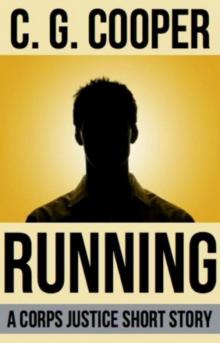 Running
Running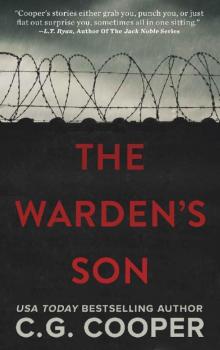 The Warden's Son
The Warden's Son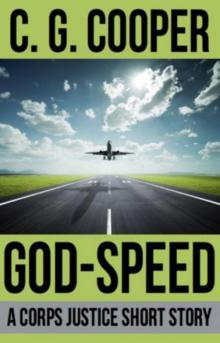 God-Speed
God-Speed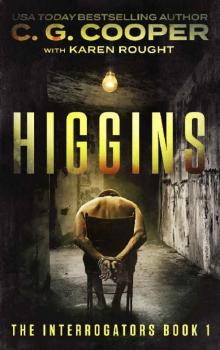 Higgins
Higgins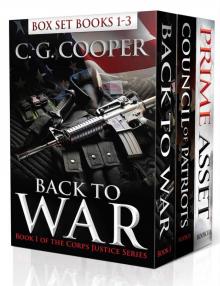 Corps Justice Boxed Set: Books 1-3: Back to War, Council of Patriots, Prime Asset - Military Thrillers
Corps Justice Boxed Set: Books 1-3: Back to War, Council of Patriots, Prime Asset - Military Thrillers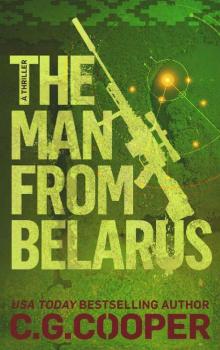 The Man From Belarus (Corps Justice Book 16)
The Man From Belarus (Corps Justice Book 16)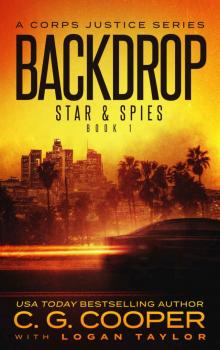 Backdrop: A Corps Justice Series (Stars & Spies Book 1)
Backdrop: A Corps Justice Series (Stars & Spies Book 1)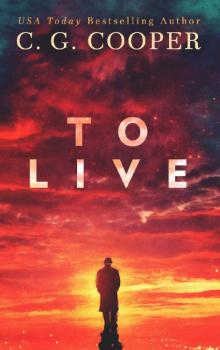 To Live
To Live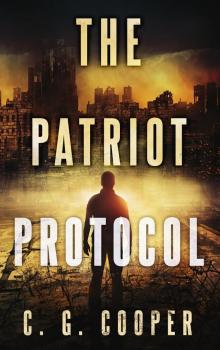 The Patriot Protocol
The Patriot Protocol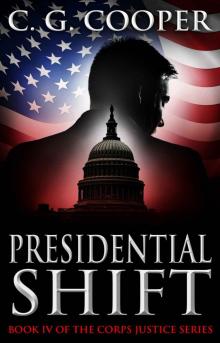 Presidential Shift
Presidential Shift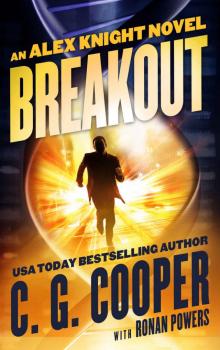 Breakout (Alex Knight Book 1)
Breakout (Alex Knight Book 1)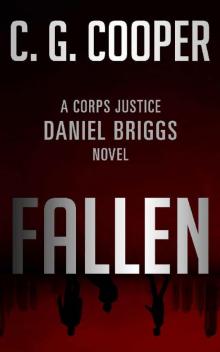 Fallen: A Daniel Briggs Action Thriller (Corps Justice - Daniel Briggs Book 2)
Fallen: A Daniel Briggs Action Thriller (Corps Justice - Daniel Briggs Book 2)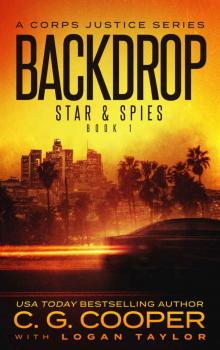 Backdrop
Backdrop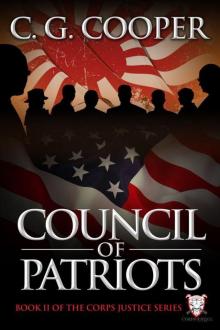 Council of Patriots (The Corps Justice Series Marine Corps Fiction)
Council of Patriots (The Corps Justice Series Marine Corps Fiction)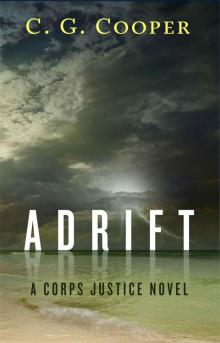 Adrift: The Complete Novel
Adrift: The Complete Novel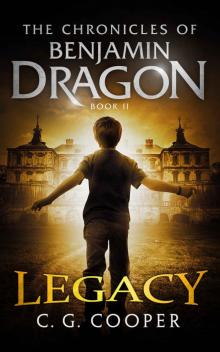 Benjamin Dragon - Legacy (The Chronicles of Benjamin Dragon Book 2)
Benjamin Dragon - Legacy (The Chronicles of Benjamin Dragon Book 2)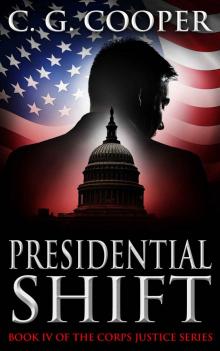 Presidential Shift: A Political Thriller (Corps Justice Book 4)
Presidential Shift: A Political Thriller (Corps Justice Book 4)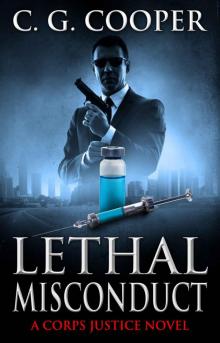 Lethal Misconduct
Lethal Misconduct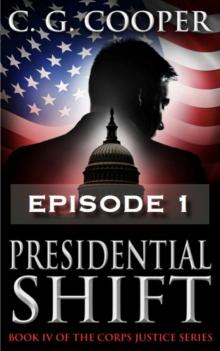 Presidential Shift - Episode 1
Presidential Shift - Episode 1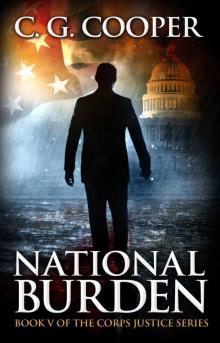 National Burden
National Burden Sabotage
Sabotage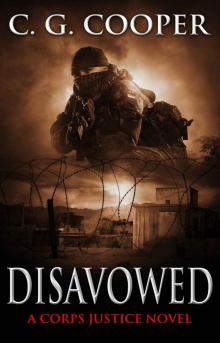 Disavowed
Disavowed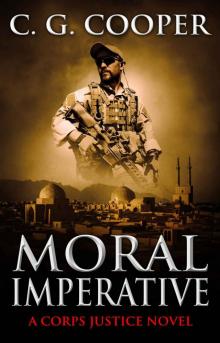 Moral Imperative
Moral Imperative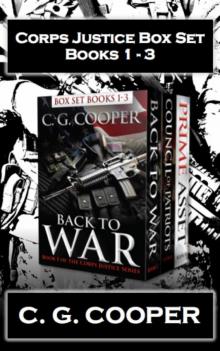 Corps Justice Boxed Set: Books 1-3: Back to War, Council of Patriots, Prime Asset
Corps Justice Boxed Set: Books 1-3: Back to War, Council of Patriots, Prime Asset